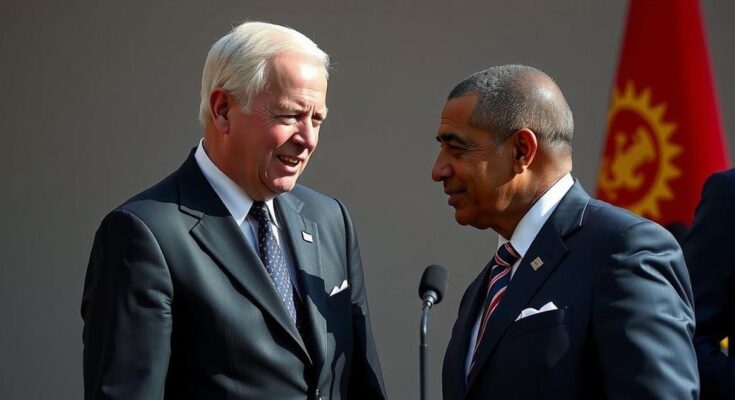President Joe Biden’s visit to Angola marks a historic engagement, pledging $3 billion for the Lobito Corridor project to boost economic ties and acknowledging shared histories of slavery. The visit emphasizes US commitment to Africa in a changing geopolitical landscape, particularly in contrast to China’s influence on the continent.
During President Joe Biden’s historic visit to Angola, he reaffirmed the United States’ commitment to strengthening its partnership with Africa, characterizing the initiative as the US being ‘all in on Africa.’ This significant trip marks the first by a sitting US president to Angola and aligns with the announcement of a $3 billion investment in the Lobito Corridor railway redevelopment project, which is aimed at facilitating the export of crucial raw materials needed for clean energy technologies.
President Biden’s discussions with Angolan President João Lourenço underscored the transformative potential of US-Angola relations. The Lobito Corridor project is set to enhance connectivity between Angola, Zambia, and the Democratic Republic of Congo, and has received favorable backing from the European Union, the G7, and various private consortia. National security spokesperson John Kirby stated that substantial progress has already been made on the project, even though its completion will require several years.
In conjunction with this development, President Biden plans to visit the Atlantic Ocean outlet of the corridor in Lobito. His visit also entails a poignant stop at Angola’s National Slavery Museum, where he aims to acknowledge the shared history between the United States and Angola regarding slavery. Notably, Biden met with Wanda Tucker, a descendant of William Tucker, who was the first enslaved child born in north America.
The meeting with President Lourenço also involved engagement with African business leaders and discussions focused on fostering public-private partnerships in the energy sector, marking a promising step toward enhancing economic collaboration between the US and Africa.
President Biden’s visit to Angola marks a pivotal moment in US foreign policy towards Africa, emphasizing a renewed commitment and collaborative approach. The Lobito Corridor redevelopment project, vital for improving infrastructure and trade connectivity in Southern Africa, is part of a broader strategy to partner with African nations on economic development and sustainable energy initiatives. This visit also highlights the differences between US and Chinese approaches to investment in Africa amid escalating tensions over technology and resource control.
President Biden’s landmark visit to Angola not only highlights an increased American engagement with Africa but also signifies a commitment to collaborative infrastructure projects and a recognition of shared historical ties. The emphasis on the Lobito Corridor project as a catalyst for economic growth underlines the US’s strategic goal of supporting sustainable energy initiatives in Africa. As the relationship deepens, it suggests a shift towards stronger cooperation on various fronts, including energy and trade.
Original Source: indianexpress.com




